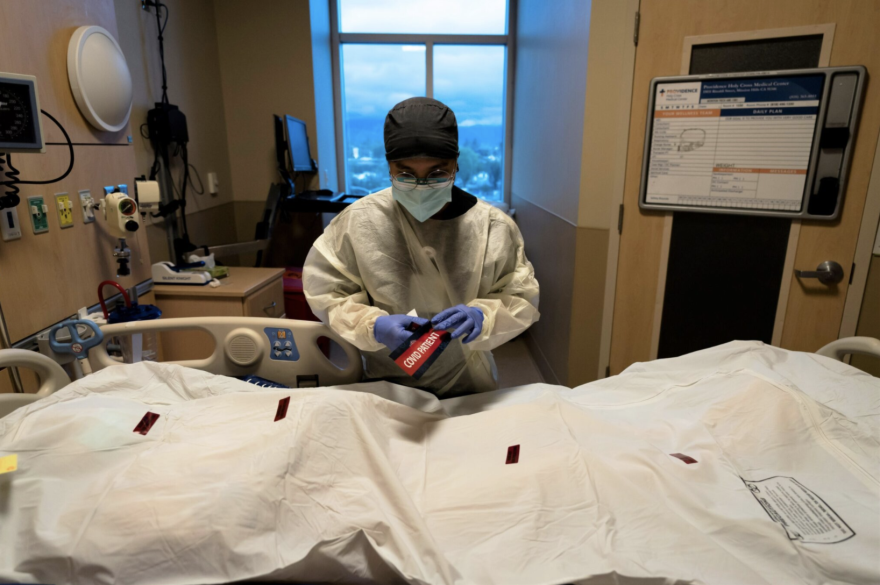They’re all familiar recommendations: Wear a mask. Get vaccinated. Get a booster.
Physicians and health experts across Texas say we’ve had the tools to protect ourselves for more than a year and a half.
But as Texans prepare to enter year three of the COVID-19 pandemic alongside yet another wave of the novel coronavirus — fueled by the new, more transmissible omicron variant — hospital workers across the state are weary, burned out, and generally frustrated by what appears to be another strain on an already exhausted workforce that could be reaching its limits.
And without increases in vaccinations, the holidays could signal a turning point for hospitalizations.
“We're trying not to panic people or throw cold water on holiday plans,” said Dr. Stephen Love, president and CEO of the Dallas-Fort Worth Hospital Council. “But we're raising our hand and reminding people COVID is still there. We've got better medications, better treatment, but the reason we're raising our hand is the sheer volume we might have to face. And we have limited staff to deal with it.”
Just more than 60% of eligible Texans age 5 and older have been fully vaccinated, according to state health data. As of Monday, more than 83% of Texas ICU beds were full, according to data from the U.S. Department of Health and Human Services. Dallas’ UT Southwestern University Hospital had no ICU beds available. San Antonio's University Health System's ICU bed capacity was at 84%, with 15 ICU beds available. At Houston Methodist, just 10 of the hospital’s 153 inpatient ICU beds were free.
“Critical care teams, they're tired,” Love said. “They've been at this for over two years now. We're trying to balance our workforce in the emergency department and the overall emotional stability of our workforce, because they're very fatigued.”
Before omicron, hospital levels were more or less under control recently, and health care workers have gotten some relative rest, even as delta remained a constant, according to Houston Methodist Hospital President and CEO Dr. Marc Boom. But that could soon come to an end.
“Certainly the last couple of months have been a time of catching one’s breath,” Boom said. “But we really wish that everyone could catch their breath for a much longer time.”
At this point, COVID-related hospitalizations are far below pandemic highs seen last last year and earlier this year. But researchers are seeing omicron spread much faster than even the delta variant, which was the previous variant of concern.
Seventy-three percent of new infections across the United States are omicron related, according to data from the Centers for Disease Control and Prevention. An unvaccinated Harris County man in his 50s is believed to be the first recorded death related to omicron in the U.S.
At Houston Methodist alone, researchers say cases are doubling every two to three days.
“We may get the double-whammy of having lots of patients coming in, but having many staff who are having to take some time off at home even if they have mild infections,” Boom said. “That’s a challenging situation.”

Houston's Memorial Hermann Hospital is also seeing an uptick in cases. Dr. Linda Yancey, an infectious disease expert at the hospital, said that by the end of the week 100% of cases will likely be omicron related.
Still, hospital leaders say they’re going into this winter surge better armed than they were last year.
“We know what staffing needs we are going to have in the midst of a surge,” Yancey said. “We know what treatments we have available, so we are ready for the worst-case scenario and crossing our fingers and hoping it doesn't happen.”
While vaccines are now widely available for most of the population, kids have only just begun to get their shots, and those younger than 5 are still not eligible.
For now, pediatric hospitalizations in Texas remain relatively low. The majority of kids hospitalized with COVID are unvaccinated.
Despite the low numbers among kids, there are signs of an uptick in state health data, and Houston's Texas Children’s Hospital says the number of kids hospitalized with COVID doubled in the past four days.
At least 37% of cases at Texas Children's are omicron related, according to Dr. Stanley Spinner, the hospital's chief medical officer. Data collection on variants at the children’s hospital is only as up to date as last week, and Spinner expected that number to more than double based on how fast omicron spreads.
“It’s like a rocketship,” Spinner said. “With delta being as contagious as that is, we saw rates increasing which we thought was quite rapidly. But this is so much faster. It’s really hard to put your hands around it.”
Houston Public Media's Paul DeBenedetto contributed to this report.




